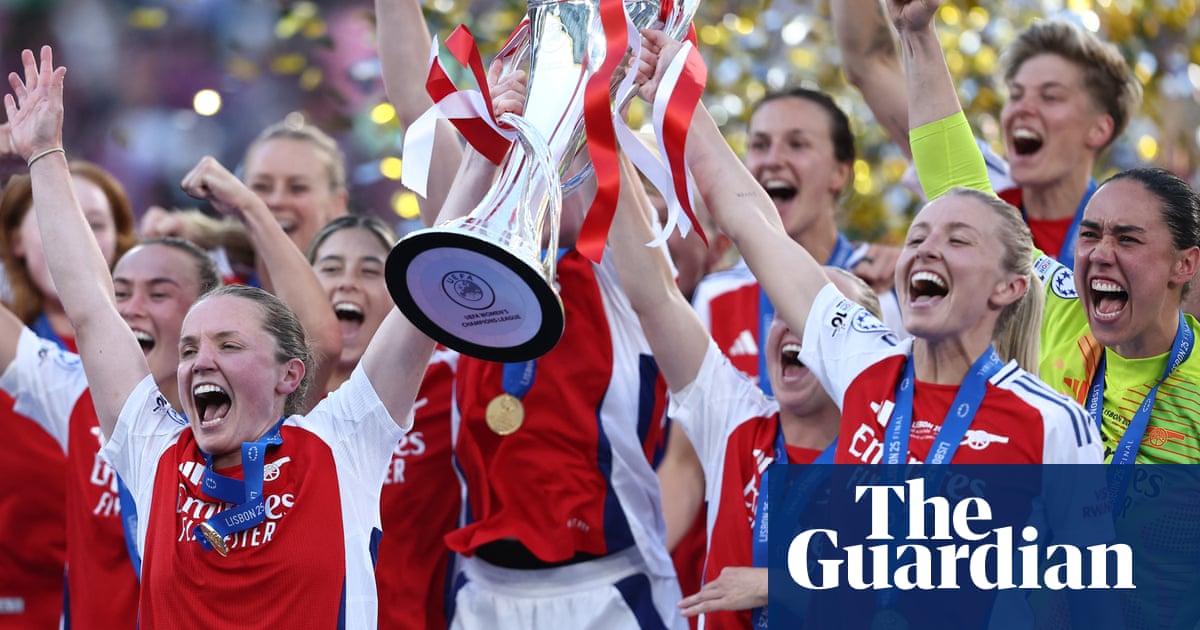Euphoria. Complete and utter euphoria. Stina Blackstenius’s second-half goal stunned the three-time European champions Barcelona to deliver Arsenal’s second European title. On the final whistle it was red and white pandemonium as stunned Gunners seemed to not know what to do with themselves.
Arsenal got as close as they could to bottling history and feeding it to the players in the buildup: there was a lunch with the 2007 European champions, notes from fans, staff and the community were pinned to a wall for them to peruse before their flight, and emotion-packed videos of who they are, where they have been and the shoulders they stand on set the tone.
Yet at the Estádio José Alvalade, expectations of a result were low, a glimmer of hope delivered by the gutsy second-leg comebacks against Real Madrid and Lyon, in the quarter-finals and semi-finals respectively, and the sublime way they have played at times this season.
A sense of fun and joy was born from the wider mood around the fixture and that spirit was evident on the pitch too. There was a fearlessness about Arsenal: instead of resorting to a double pivot against the holders, Renée Slegers stuck with a formula that had worked for them in the second leg of their semi-final against Lyon and Manchester United on the final day of the Women’s Super League season. Arsenal were not in Lisbon to sit back, they were there to take the game to the Catalan giants and their pressing play and organisation in the opening half was superb.
The battling play and freedom with which they played it clearly frustrated the champions and Slegers’ side had the better chances of the half: Caitlin Foord’s header wide of the far post, Chloe Kelly’s volley over the bar, a disallowed own goal with Kelly offside in the build up and Cata Coll’s save from Frida Maanum, all close but not close enough.
The serious attitude Arsenal as a whole have taken towards the women’s team was evident in the stands – the co-chairman Josh Kroenke had come from Denver to join assorted members of the hierarchy and David Dein, the former vice-chairman and former president of the women’s team. That stood in sharp contrast to the indifference shown to Manchester United Women by their minority owner, Sir Jim Ratcliffe, whose absence at the past two FA Cup finals was widely derided.
Reaching the break with the game goalless was an achievement against a Barcelona side playing their 100th Champions League game, their first coincidentally against Arsenal in the 2012-13 last 32.
TheBlaugrana, seeking a hat-trick of wins, stepped up a gear in the second half but Arsenal’s defence, which shipped 12 goals in their final three games of the WSL season, stood firm.
They needed one chance, one escape into the Barça half, and it came in the 74th minute. A rare Arsenal corner was cleared but worked back in to the former Barça player Mariona Caldentey, who paused before finding Beth Mead hovering on the edge of the box. The England forward played in her fellow substitute Blackstenius and the Swede fired low past Coll.
Sign up toMoving the Goalposts
No topic is too small or too big for us to cover as we deliver a twice-weekly roundup of the wonderful world of women’s football
after newsletter promotion
Barcelona were sure it was offside, but it wasn’t, the crowd jeered, the pocket of Arsenal fans roared, and the team that is king of the dark arts, of slowing a game, stifling play and disrupting momentum started to be given a taste of their own medicine.
The Barcelona fans had been the loudest throughout, but it was the corner of 5,000 plus Arsenal fans that rocked the stadium at the close.
More to follow
